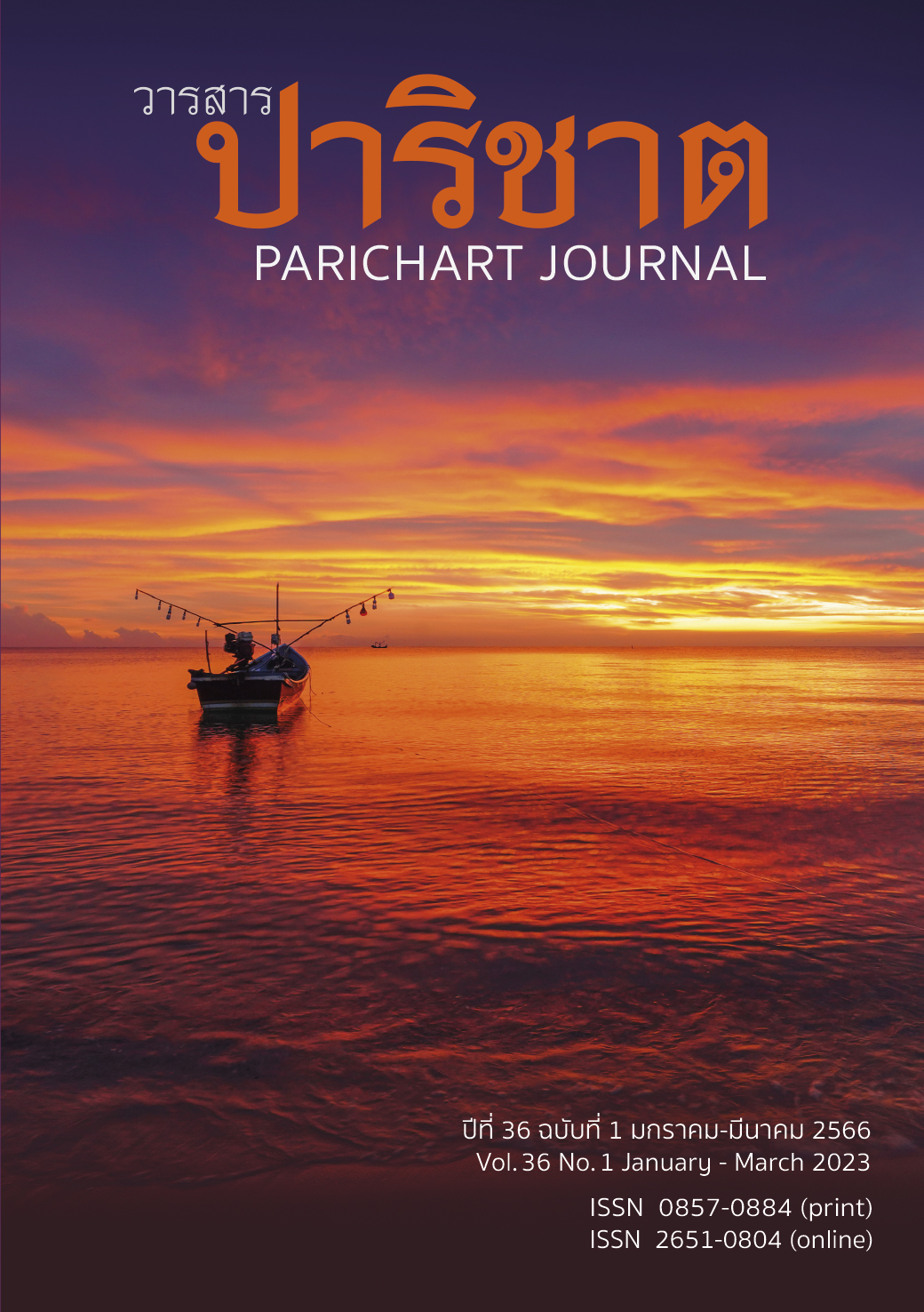A Model for Agritourism of Chiang Saen Learning Center, Chiang Rai Province
Main Article Content
Abstract
The purpose of this research article was to study the model of agritourist activities of Chiang Saen Learning Center. This is a mixed research study. The data were collected by using evaluation forms of agro-tourism management potential, observation forms, and semi-structure in-depth interviews. The data were collected by using a focus group of stakeholders, content analysis, and in-depth interviews, totaling 20 informants. The data were validated using triangulation, analyzed for validity, and concluded with descriptive analysis. The research results revealed that overall, the potential of agricultural tourism shown in moderate level with score of 58.66. The learning center has developed agritourism by using an integrated farming system employing the principles of the sufficiency economy. 7 centers have been developed in terms of agritourist activity development with the tourists’ satisfaction being ranked the highest. Moreover, staff have knowledge and skills that contribute to the creation of tourism products. The Chiang Saen Learning Center has developed agritourist activities to encourage itself to be agricultural tourist destinations with effective tourist measures for Thais, foreigners and those interested. This is considered to be beneficial to the development of the center to be both academic and tourist destination of Chiang Saen District, Chiang Rai Province.
Article Details

This work is licensed under a Creative Commons Attribution-NonCommercial-NoDerivatives 4.0 International License.
References
Department of Tourism. (2021, July 1). Draft the framework of the tourism development plan No. 3. https://www.nesdc.go.th/ewt_dl_link.php?nid=11684&filename=index
Marques, H. (2006). Searching for complementarities between agriculture and tourism – the demarcated wine-producing regions of northern Portugal. Tourism Economics, (12)1, 147–155.
Plant Genetic Conservation Project under The Royal initiative of Her Royal Highness Princess Maha Chakri Sindhorn. (2022, May 31). Plant Genetic Conservation Project. http://www.rspg.or.th/information/index.htm
Office of National Economic and Social Development. (2016, October 1). National Economic and Social Development Plan No. 12 (2017-2021). https://www.nesdc.go.th/ewt_dl_link.php?nid=9640
Srisomyong, N. (2009). Survey of foreign tourists’ attitudes towards travel decisions in the southern provinces that were hit by a tsunami disaster [Master’s thesis, University of the Thai Chamber of Commerce]. University of the Thai Chamber of Commerce. (In Thai)
Department of Tourism. (2021, September 21). Agritourism Quality Standards Assessment Guide. https://www.dot.go.th/ebooks/ebooks-view/422
Kanjanakit, S. (2001). Recreation and tourism. Chulalongkorn University. (In Thai)
Buhalis, D. (2000). Marketing the competitive destination in the future. E-Journal of Applied Tourism Management, (21)1, 97-116.
Dickman, S. (1996). Tourism: An introductory text (2nd ed.). Hodder Education.
Thammabutr, P. (2006). Teaching documents on principle of ecotourism. Srinakharinwirot University. (In Thai)
Choibamroong, T. (2009). Agricultural resources research for sustainable agro–tourism: A case study of Surat Thani, Thailand. The Thailand Research Fund. (In Thai)
Creighton, J. (2005). The public participation handbook: making better decisions through citizen involvement.(1st Edition)./Jossey-Bass A willy imprint.
Sirorot, P. (2003). A handbook of public participation. Thammasat University. (In Thai)
Walaisathien, P. et al. (2005). Learning innovations: People, community, and development. Phisit Thai Offset
Singnual, N., & Tiasutikul, P. (2021). A Study of the potential of agro-tourism management at Ban Khlong Arang, Tumbon Bangkeng, Sa keaw Province. Journal of MCU Social Science Review, (10)3, 143-154. (in Thai)
Tongla, P., & Samarak, P. (2019). The Management Potential of Chanthaburi Agro-tourism Attractions. Journal of the Humanities and Social Sciences Ubon Ratchathani University, 11(1), 190 - 213. (in Thai).
Sattaruttanakagorn K. (2007). Feasibility study of agro-tourism management: A case study of Ma-O Village, Mae Tha District, Lampang Province [Unpublished doctoral dissertation]. Chiang Mai University. (in Thai)
Doloh, S., & Thongsri, P. (2020). Evaluation of Agritourism Potentials in Tanyong Pao Community,Tha Kamcham Sub-district, Nong Chik District, Pattani Province. Humanities & Social Sciences, 37(1), 80-111. (in Thai)
Chantraprayoon, S.O., & Trirat, S. (2018). Community participatory development on tourism program and creative activities under green map conception at BanPong, Sansai, Chiangmai. Journal of Yala Rajabhat University, 13(2), 230-243. (in Thai)


